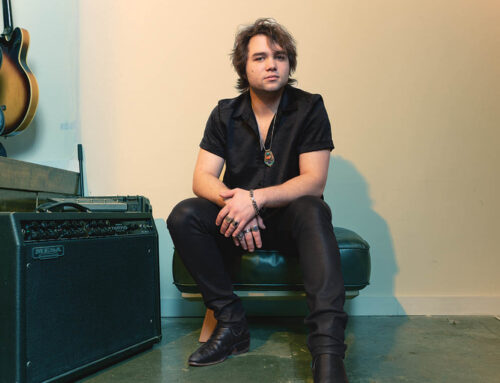When neighborhood resident Joe Orchard married his wife Elizabeth in 1950, they were living in Darien, Conn., with a Dalmation dog and a station wagon. She worked at Glamour magazine as a fashion editor, and he commuted into Manhattan for his job at an advertising firm.
It was a short-lived stint at the typical suburban life that would not soon surface again for the Orchards.
“I like to eat food I’ve never eaten, and go places I’ve never been, and do things I’ve never done,” says Joe Orchard, a neighborhood resident. “I think that’s the most interesting part of life.”
In fact, even before that brief period of normalcy, Orchard didn’t seem the type to live a life more ordinary. As early as his high school years, he was entertaining his chums with a trained dog act and ukulele hillbilly music. His high school classmates voted him the student with the best sense of humor his senior year.
After earning a degree from New York’s Jesuit university, Fordham, in 1943, he enlisted in the Navy, and the next few years proved even more adventurous.
He trained sailors in amphibious warfare in San Diego and trained troops in invasion techniques in Hawaii. When he was shipped off to war, he participated in a number of invasions, including Guam, two in the Philippines (where he watched as a Japanese suicide bomber pummeled the ship next to his) and one of the most well-manned invasions in history, Iwo Jima.
In 1954, after leaving the army and marrying Elizabeth, the couple moved to Texarkana to help his wife’s ailing uncle run the family’s generations-old pecan farm. Joe, who’d spent most of his life in the Northeast, was suddenly in “culture shock.”
“There’s a whole culture attached to pecans,” Joe says. “People would come from town to pick them up by the pound…it’s a big social thing: whole families come down.
“There’s a whole different psychology and philosophy on the farm. You wonder why farm people are so friendly? It’s because your neighbor is also your fireman. By that, I mean you have to rely on your neighbors for any problems you might have. It’s one of my sociological theories.”
It was a sociology and a life he found he could get used to. And he soon found ways to further the family enterprise along. They began selling pecans not only to visiting families, but also to local merchants and via mail order.
But Orchard, or, as the northerner had come to be known by then – Pecan Joe – knew there was still a market out there he hadn’t quite figured out how to crack.
After his time in the Navy, he had worked for Vicks Chemical Company (makers of Vicks VapoRub) traveling the country on business. It was a time when the roadside chain store was a relatively new phenomenon.
“I noticed the old Stuckey’s stores, and their whole marketing approach with the signs on the highways, and selling candies and things,” he says.
With a convergence of four major highways only 10 minutes from the farm, he decided he could do for Pecan Joe what Stuckey’s had done for itself throughout the South.
“We took over an old Victorian building that had been a barbecue shack, and put this huge sign that said Pecan Joe’s, and made it into a store with candies and souvenirs. All the signs had that face,” he says, pointing to the last surviving piece of Pecan Joe’s literature, a decades-old brochure that shows a smiling man with a 10-gallon cowboy hat. “That’s me.”
Orchard stayed in the pecan business for almost 15 years, opening seven stores in Texas, Arkansas and Missouri. The stores were, he says, a “fabulous success. Cars would be parked up and down the street. The place would be mobbed.”
But the construction of major super-highways soon put the stores out of many travelers’ reach, and Joe sold the company in the late ’60s.
Though he had an early passion for the business, he says coming up with the concept has always been more fun than running it.
“Innovators are interested in concepts and ideas, whereas someone who operates has to keep his mind on everyday business,” he says. “We were worrying about our employees’ kids and putting them in the hospital when they were sick, so I am not psychologically attuned to making money. I’m attuned to developing and creating.”
Though Pecan Joe’s has long since gone out of business, it was immortalized in a road-trip song titled The Glory Road written by Terry Taylor of the band Daniel Amos: “We hit the Metro out in Tulsa/bought a steer horn at Pecan Joe’s/Saw the blue whale in Catoosa/The reptile farm in Cuba, Mo.”
After selling the business, Joe and Elizabeth moved to Dallas, and Joe’s mind soon turned to other new business concepts he could reinvent. For a time, he marketed the air machines now common at most gas stations.
“There was a full-page ad that said: Can you sell air?” he says. “This, I thought, I have to read. I respond to challenges.”
But vandalism problems plagued the air-machine business, and Joe gave what was left of the machines to his son. A short stint renting television sets out of drive-in grocery stores finished shortly after it had begun.
“I had some black and white TV’s that I was going to give to Goodwill, but they came when I wasn’t home, and Betty gave them all the color ones, too,” he laughs. “So we just got out of that.”
Soon afterward, the Orchard family came into an inheritance, and the innovator has since been free to spend his time with his wife and four children. He’s also free now to explore ideas not related to enterprise, which, by his own admission, is probably a good thing.
“I’m not naturally a good businessman,” he says. “My two chief interests are the Great Books Club and the Philosopher’s Forum. And what I really like to do is go to school.”
Joe has attended all the major universities in Dallas – Southern Methodist University, University of Texas at Dallas and University of North Texas – taking classes concerning philosophy, politics, aesthetics, law and religious history, to name a few.
He also substitute teaches in the Dallas ISD high schools and junior highs, including Hillcrest and Benjamin Franklin.
“You feel like you’re making a contribution,” he says simply, and then adds with a laugh, “and if you do that and get paid, well hey, that’s pretty good.”
But, not surprisingly, Joe’s sense of accomplishment really has nothing to do with his financial success.
“Nickels and dimes bore the hell out of me,” he says. “Success is finding what makes you happy.”
And, once upon a time, it was being Pecan Joe.
“I sing in the Christ the King (church) choir, and I was conversing with someone and told him I was from Texarkana, and he said: Did you know Pecan Joe?
“It was a very successful business.”






